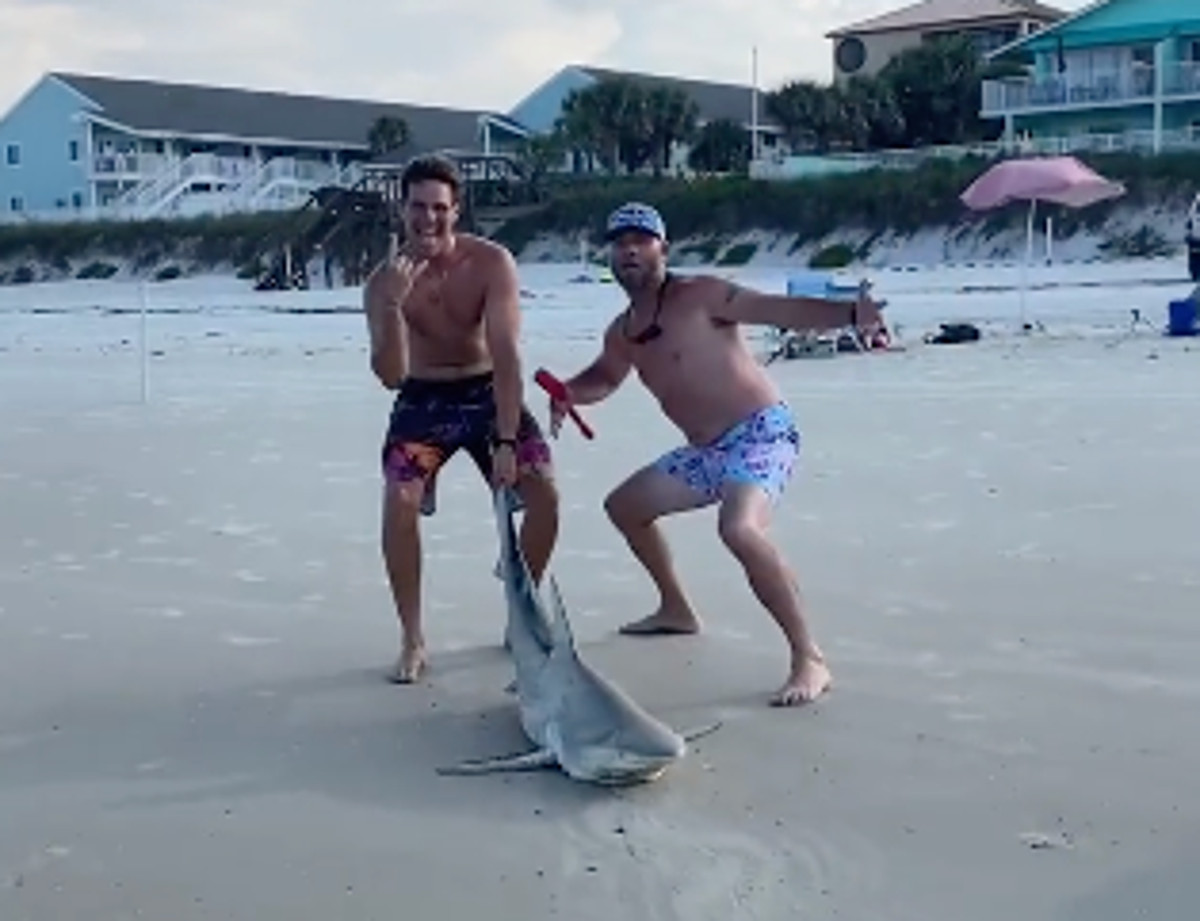
A video of two fishermen in Florida dragging a shark across the beach and stabbing it in the head is generating controversy, with critics accusing the men of animal cruelty.
Bystander Mariana Sabogal filmed the pair on 19 August, in New Smyrna Beach, on the state’s eastern coastline.
In the clip, which has been viewed nearly 18,000 times, Ms Sabogal pleads with the men to release the shark into the water, as they mug for the camera and drag the shark across the beach.
“Can you please put it back?” she asks.
“You put it back,” one of the men says.
“I’m not a vegetarian, but it doesn’t matter. You shouldn’t be doing that with animals,” she continues.
In response, one of the men says he’s committing a “legal harvest,” while another claims he’s taking the shark to “feed my family.”
The Florida Fish and Wildlife Conservation Commission told local news station WESH that it appears the men weren’t breaking any laws, as killing sharks is legal under certain circumstances, including by those on shore who have special permits.

“It is common practice for anglers to euthanise sharks after landing for ethical and safety concerns,” the FWC said. “This video is not currently under investigation as no violation of state law regarding the method of harvest occurred.”
Ms Sabogal was devastated by what she saw, she later wrote on Facebook.
“I am speechless,” she said. “This is the world we live in and sadly enough we need to accept that there’s people in this world that find enjoyment in doing this. We need more shark awareness and education, and better laws to prevent and punish this type of behavior. Being a shark lover, I feel I just witnessed someone killing an amazing creature for absolutely no reason.”
In Florida, anglers 16 and older can fish for sharks with a permit, though the FWC encourages people to release the creatures rather than kill them.
“Sharks are apex predators that play an important role in marine ecosystems,” the agency says on its website. “Releasing sharks in a way that increases their chance of survival is an important step toward achieving and maintaining healthy, sustainable shark populations.”
Numerous commenters on the video condemned the men for stabbing the shark instead of releasing it.
“Such a shame,” wrote WLRN reporter Jenny Staletovish. “Spinner sharks, if that’s what it is, are such a cool thing to see. IUCN [ International Union for Conservation of Nature] classifies them as ‘near threatened’ and vulnerable along the [southeast] US coast. And they can leap at nearly 50 mph.”
“Guarantee they did not have a license .. and aren’t going to eat that shark,” added commenter Elizbeth Cano. “I’m all about hunting and fishing sustainably but sharks are critical to our oceans ecosystems and are protected.”
As The Independent has reported, climate change and other human impacts on nature are harming shark populations across the world, and driving the fish, which don’t feed on humans, into areas where they have greater contact with people.
All species are valuable, and occupy niches that sustain the larger web of life around them, but sharks are what’s called a “keystone species,” according to Dr Neil Hammerschlag, director of the Shark Research & Conservation Program at the University of Miami. That means they have a disproportionate impact on the ecosystem.
They’re opportunistic hunters, going after food species that appear in high numbers, keeping various populations in check. In tropical systems, for example, sharks feed on turtles, allowing sea grass to grow in large enough abundance to provide habitat for fish species and sequester carbon.
“If you have these apex predators that are changing when and where they’re moving to, that’s going to have consequences on the rest of the species of where they’re going to and where they left,” Dr Hammerschlag told The Independent. “It’s going to change the predator-prey interactions int the former and in the new part of their range.”
Shark attacks are extremely rare and rarely fatal, but people kill an estimated 100 million sharks per year, often incidentally as part of fishing for other species, or in expensive and often ineffective shark culls.
Overfishing has killed an estimated 71 per cent of the overall shark population since 1970.







